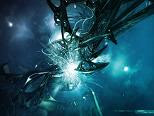Directed and adapted for the big screen by Jane Anderson (When Billie Beat Bobby, Madmen), The Prize Winner is based on a memoir by Terry Ryan (portrayed in the film by Ellary Porterfield). Julianne Moore is eminent in the role of Evelyn, whose unshakable resolve and blissful humor is the glue which keeps together a family teetering on the edge of financial and personal woes. Intially, viewers may perceive the character's persistent determination as transparent in the face of one challenge after another. There is one scene, however, in which Evelyn, discouraged by her family's latest predicament, hides her grief by weeping alone in an upstairs bedroom. Moore succeeds in combining a relentless spirit with a touch of humanity, thus creating a character whom viewers will admire not as a hero, but as a fine example of a good human being.
Midway to the opposite side of the spectrum is Woody Harrelson as Kelly Ryan, whose down-and-out nature is a result of an accident that retired his prospects in music to the heat and labor of a sweat shop. Harrelson portrays the character as an anti-hero in such back-to-back scenes in which he is the loving, diligent husband and the irresponsible patriarch. Following a reckless outburst in which Evelyn is inadvertently injured, audiences will feel a strange mix of resentment and sympathy, which Harrelson successfully evokes in Kelly, whom he describes as "a drowning man." Another performance of note is that of 16-year-old Ellary Porterfield as Terry "Tuff" Ryan, the most observant of the Ryan children, who inherits all her mother's flare, but has yet to develop a wisdom for restraint. While stranded at a gas station on a 100-mile trip to Indiana, Evelyn teaches Terry to take life in stride rather than misfortune in a scene that will bait a subtle smile from viewers for the quiet power of a mother-daughter relationship that is a highlight of this contemplative and emotional film.
Regarding technical merit, The Prize Winner is one of few films to break the fourth wall without being lame. The series of montages in which Evelyn directly addresses the audience are imaginative, but not imposing (including a trip on an envelope that gives a new meainging to "air-mail). Composer John Frizzel's original score adds a fifty's, classic feel to a midwest setting similar to Mayfield and 485 Mapleton Drive. A recurring theme on which the film does not focus directly, but in context, is anti-feminism as Evelyn struggles to maintain her houseland under the critical scrutiny of male authority. Chiefly, an absorbing and touching film that is likely to draw a few laughs and knowing smiles from family's that are, as Kelly Ryan would have it, just "too damn happy."
Visit my website at http://369-shop.phase2profits.net to purchase The Prize Winner of Defiance Ohio and other films.

